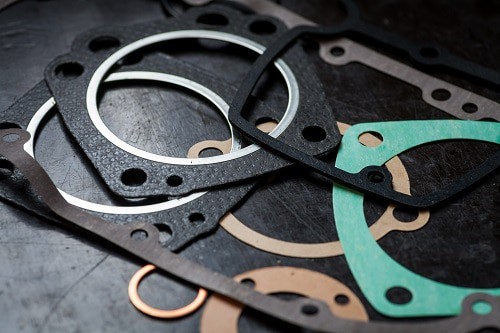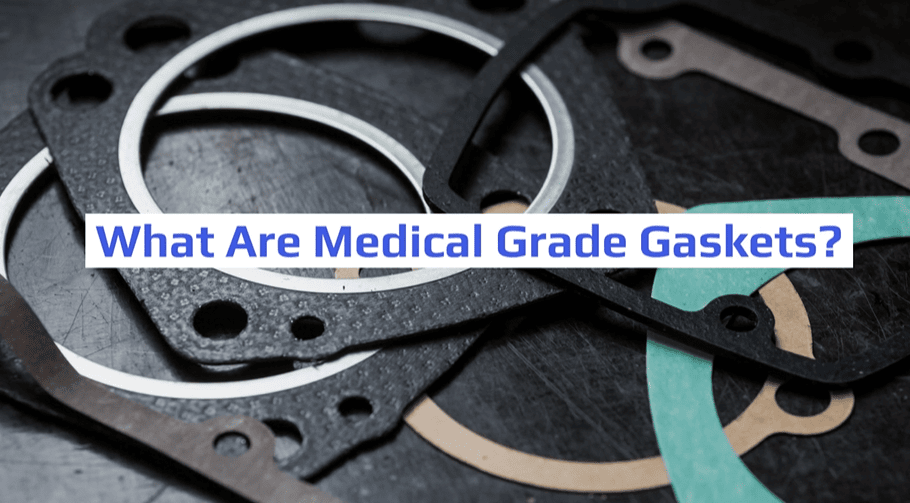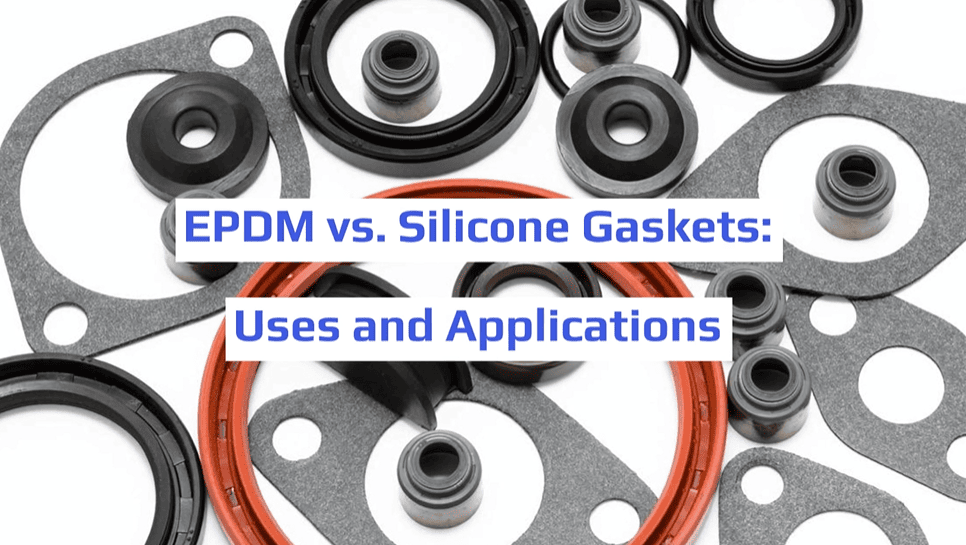What Are Medical Grade Gaskets and How Do They Work?
Leave a CommentUnlike standard gaskets, medical-grade gaskets are specially designed for safe, effective performance in medical applications. Fournier Rubber & Supply Company manufactures custom gaskets for medical purposes. Having long served this market with gaskets and other manufactured goods, we are knowledgeable about the needs of end users and provide solid sealing solutions that can meet strict industry standards.
Here you’ll learn more about these custom medical device seals, including their benefits and applications.
What Are Medical Grade Gaskets?
Mechanical strength, chemical resistance, and sanitary sealing capabilities are all crucial considerations in the pharmaceutical and biomedical industries. Medical device seals and gaskets can offer protection against fluids, contaminants, electromagnetic interference, and dust. These rubber and plastic components can also resist heat, flame, electrostatic discharge, and electrical conductivity.
When selecting medical-grade seals, consider hardware requirements, temperature, pressure, motion, vacuum, seal life expectations, and your specific process media. The medical rubber grades offered by Fournier Rubber & Supply Company are designed to provide sealing that can endure a variety of process media, active pharmaceutical ingredients (APIs), and rigorous cleaning procedures.
Because medical-grade gaskets are now exposed to a broader range of chemicals and temperatures than ever, it is critical to select a seal manufacturer that meets stringent specifications.
Applications of Medical Grade Gaskets
Medical seals are used in almost every type of medical equipment, such as medical pumps, IV components, implant materials, feeding devices, lab equipment, transportation systems, industrial storage, and temperature control devices.
Available in different sizes and shapes, these seals are designed to protect both humans and devices from potentially harmful leakage. Wherever gases or liquids are pumped, drained, transported, contained, or distributed, medical seals keep these process media contained.
We provide medical gaskets for applications such as:
- O-rings for dialyzers
- Medical appliance seals
- Medical diagnostic components
- Medical pump seals
- Miniature elastomer seals
Benefits of Using Medical Grade Gaskets
Medical-grade gaskets are primarily made of silicone, a compound that is resistant to bacterial growth and moisture. Silicone is non-toxic and biologically inert, and its thermal resilience allows it to be sterilized and stored at high temperatures. The material is also biocompatible, indicating that it can be utilized in medical devices that make direct contact with human tissue. All these features make medical-grade silicone gaskets ideal for sealing and prosthetic applications.
Our medical sealing solutions provide a variety of benefits, including:
- Versatility: Medical-grade gaskets can be easily integrated into various applications, including slow dynamic and static applications.
- High and low temperature resistance: Silicone gaskets work effectively in both hot and cold environments.
- Chemical resistance: Medical-grade rubber washers can withstand substances like alcohol, chemicals, and high-purity water.
- Withstands multiple sterilization processes: Medical-grade silicone gaskets can undergo aggressive sterilization processes without breaking down or compromising the integrity of your medical device.
- Cost-effective: Producing medical-grade gaskets is relatively inexpensive, so you can get high-performance, reliable gaskets at an affordable price.
- Compliant with regulations: Medical-grade silicone gaskets meet stringent medical industry standards.
- Customization: Our gaskets are available in materials designed especially for use in the life sciences. We can also tailor our custom medical-grade gaskets to meet your specific needs.
Medical Grade Gaskets and Seals at Fournier Rubber & Supply
Custom medical seals and gaskets are essential components in the medical devices people rely on daily to survive. Fournier Rubber & Supply Company manufactures standard and custom rubber products for nearly every application, including medical applications. Learn more about our rubber gasket products, including the materials we use, the markets we serve, and our capabilities. Contact us or request a quote to get started on your solution.
Types of Food Grade Gaskets & Material Selection
Leave a CommentCertain types of materials make gaskets food grade, with different applications for each material. At Fournier Rubber & Supply Company, we offer a selection of food-grade gasket material options based on our customers’ needs. We’ll help you find what you need to meet your unique specifications and design a custom gasket for your application.
When looking for custom food-grade rubber gaskets, you must take certain considerations into account.
What Makes a Gasket Food Grade/Food Safe?
Food-grade gaskets feature several characteristics that make them suitable for food processing and other applications in the food and beverage industry. These factors include:
- The ability to withstand high pressures: A food-grade gasket will be able to resist high-pressure levels in food processing, packaging, and other processes.
- A wide temperature tolerance: Gaskets must also be able to resist high and low temperatures, with many materials available that meet various temperature resistance requirements. Materials such as nitrile, Neoprene, and EPDM rubber offer wide temperature tolerances for different applications.
- Resistance to degradation and bacterial growth: Gasket materials must be highly resistant to acids, oils, and chemicals that might otherwise degrade the gasket material or allow for the buildup of bacteria.
- No impact on food quality or safety: The combined features of food-grade gaskets ensure that their use won’t have any negative impact on the quality or safety of food products.
Food Grade Gasket Materials & Properties
Depending on the designated application, businesses can choose from multiple food-grade gasket materials that the Food and Drug Administration (FDA) has approved for food and beverage processes.
These materials include the following:
FDA Silicone Rubber
This FDA-approved food-grade gasket material offers plenty of versatility to work with various applications. It normally has a white, gray, red, or translucent color and can resist temperatures between -67° F and 450° F, which is why it’s ideal for use in applications with high heat. It’s also suitable for outdoor applications because of silicone’s natural resistance to ozone and ultraviolet light.
FDA Nitrile (Buna-N) Rubber
If you require a material that’s resistant to oil, FDA nitrile rubber works well regardless of exposure to oil or grease. It typically comes in white or black and can hold up to temperatures between -40° F and 212° F. It can also handle discharge and suction for food and dairy applications.
FDA EPDM Rubber
EPDM rubber’s resistance to ultraviolet light and wear protects gaskets from degradation under exposure to the elements. This feature makes it suitable for grain silos and other outdoor food production applications. It’s black in color and resistant to temperatures between -40° F and 250° F. It’s also highly resistant to oil.
FDA Neoprene® Rubber
This off-white rubber prevents gaskets from breaking down under exposure to various foods and oils. It’s particularly popular in the food and beverage industry because of its FDA-approved composition and tensile strength, with a temperature resistance ranging from -30° F to 220° F.
FAQ
Are silicone gaskets food safe?
Silicone gaskets work in many food processing and packaging applications because of their food-safe features. Silicone has high-temperature resistance, chemical resistance, flexibility, and water repellence. It’s also resistant to aging, ozonation, and weathering.
How do food-grade gaskets work?
Food-grade gaskets use food-safe materials that prevent contamination during any type of process in food and beverage production. Unlike other gaskets, they offer superior sterility and flexibility.
What are food-grade gaskets?
Once the FDA approves and rates gasket materials, gaskets composed of these materials are considered food-grade products. Although the FDA doesn’t approve gaskets, gaskets using these materials and FDA-approved manufacturing processes remain compliant with FDA regulations.
Why Choose Fournier Rubber & Supply Company for Food-Grade Gaskets?
If you need food-grade gasket materials and custom gaskets for food and beverage applications, Fournier Rubber & Supply Company will provide you with the ideal solutions. Depending on the needs of your application, we offer custom gaskets made with either silicone rubber or EPDM rubber materials.
Contact us today to learn more about our offerings and reach out with any questions you have, or request a quote to get started on a custom food-grade gasket design.
EPDM vs. Silicone Gaskets: Uses and Applications
Leave a CommentGaskets are crucial sealing and cushioning materials for various residential, commercial, and industrial uses. Selecting the right kind of polymer for the gaskets is key to preventing repair costs, downtime, and other adverse effects should the sealing fail.
Silicone and EPDM (ethylene propylene diene monomer) are popular materials used for gaskets. However, their properties have different pros and cons for certain applications, so the best material choice depends on your industry or application.
Read on to learn more as we discuss the differences between EPDM vs. silicone gaskets, including their respective properties, compositions, benefits, and applications.
What Is EPDM?
 EPDM is a type of synthetic rubber created by mixing various proportions of ethylene, propylene, and diene. The major component is ethylene, which takes up 45% to 75%, while diene monomers give EPDM its cross-linking structure that provides great flexibility, resilience, and durability. EPDM’s molecular mesh structure also gives it superior elasticity and resistance to aging.
EPDM is a type of synthetic rubber created by mixing various proportions of ethylene, propylene, and diene. The major component is ethylene, which takes up 45% to 75%, while diene monomers give EPDM its cross-linking structure that provides great flexibility, resilience, and durability. EPDM’s molecular mesh structure also gives it superior elasticity and resistance to aging.
EPDM rubber is resistant to heat, cold, ozone, steam, electricity, UV rays, abrasion, and water, so it is preferred for various outdoor and harsh environments. Some of its applications include non-slip coatings for decks, cooling system hoses, roofing, HVAC systems, plumbing, and window and door seals in vehicles.
Pros & Cons of EPDM
Here is an overview of the advantages of using EPDM gaskets:
- Lower cost than silicone: EPDM is a great choice if you are looking for a cost-effective option with excellent performance in harsh outdoor conditions.
- Water resistance: EPDM is more resistant to water than other rubbers, so it’s a popular choice for roofing and plumbing.
- Steam resistance: This rubber can function in steam conditions up to 392 °F without air and remains stable in high temperatures.
- Abrasion and weather resistance: EPDM rubber has excellent resistance to abrasion and can withstand the degrading effects of ozone, weathering, and UV ray exposure.
- High tensile strength: EPDM has a higher tensile strength compared to silicone and other polymers.
EPDM has some disadvantages in certain applications:
- Not food-safe: EPDM rubber is unsafe for food applications due to its chemistry and formulation.
- Does not withstand automotive fluids: EPDM breaks down with exposure to automotive fluids such as hydrocarbon fuel, grease, and oil.
What Is Silicone Rubber?
Silicone or polysiloxane is an inert synthetic compound available in different forms, including rubber, resin, or oil. Silicone rubber is manufactured by extracting silicon from silica, passing it via hydrocarbons, and combining the resultant material with chemicals to form the rubber. It’s a polymer that contains silicon, carbon, oxygen, hydrogen, and sometimes other elements.
Silicone is highly flexible and temperature-resistant. It is also gas permeable, nonstick, hypoallergenic, flame-resistant, and chemically inert. These properties make silicone a popular choice for adhesives, sealants, medical applications, insulation, cookware, and lubricants.
Pros & Cons of Silicone Rubber
Silicone rubber gaskets provide the following benefits:
- Suitable for a wide range of applications: Silicone is highly versatile and ideal for a wide range of applications.
- High thermal resistance: It can withstand extremely high (482 °F) and low (-67 °F) temperatures.
- Food-safe: Silicone is safe to use in food and beverage processing applications due to its unique chemistry.
- Resistant to automotive fluids: Silicone does not degrade with exposure to automotive fluids.
- Good compression set: The material has an even better compression set than EPDM.
- Long lifespan: Silicone has a longer lifespan, saving on replacement costs and reducing equipment downtime.
The material has some drawbacks if these factors influence your project:
- Expensive: Silicone costs more based on the specific material formulation.
- Swells when exposed to water: Silicone is not suitable for water-based applications because it swells when exposed to water.
EPDM vs. Silicone Properties
Here’s a comparison table summarizing the differences between EPDM and silicone gaskets:
| EPDM | Silicone | |
|---|---|---|
| Temperature Range | -40 °F to 302 °F (-40 °C to 150 °C) | -67 °F to 482 °F (-55 °C to 250 °C) |
| Weather Resistance | Excellent | Excellent when modified |
| Oil Resistance | Poor | Great |
| Tear Strength | Great | Good |
| Abrasion Resistance | Good | Poor |
| Ozone/UV Resistance | Excellent | Excellent |
| Dielectric Properties | Poor | Excellent |
| Flame Resistance | Good | Great |
| Acid/Alkali Resistance | Excellent | Poor |
| Tensile Strength | 14 MPa | 5 MPa |
Industrial Rubber Gaskets From Fournier Rubber & Supply
While gaskets are relatively inexpensive components, it’s important to choose the right gasket material for your specific use. Most gasket failures occur because the material is wrong for that environment. So, before choosing either EPDM or silicone rubber as a gasket material, you should first consider the extent to which these factors will influence gasket performance:
- Abrasion
- Pressure
- Temperature
- Electromagnetic interference
- Chemicals, UV, and ozone
For help choosing the perfect gasket material or to start your project, request a quote from Fournier Rubber today.






